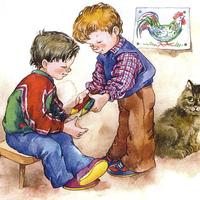«Случай»
case
"Ereignis"
"Happening"
"Événement"
"Studio di caso".
「ケーススタディ
"사례 연구."
"Case Study."
"Estudo de caso".
"Fallstudie."
Мама подарила Коле цветные карандаши.
|gave|Kola|colored|pencils
|deu|||
Mama gab Kolya Buntstifte.
Mom gave Kolya colored pencils.
Maman a donné à Kolya des crayons de couleur.
Однажды к Коле пришел его товарищ Витя.
one day|||came||friend|Vitya
Certa vez|||||companheiro|
Eines Tages kam sein Freund Vitya nach Kolya.
One day his friend Vitya came to Kolya.
Un jour, son ami Vitya est venu à Kolya.
— Давай рисовать!
|draw
- Lass uns malen!
- Let's draw!
Коля положил на стол коробку с карандашами.
Kolya||||box||pencils
Kolya stellte eine Schachtel Bleistifte auf den Tisch.
Kolya put a box of pencils on the table.
Kolya posa une boîte de crayons sur la table.
Там было только три карандаша: красный, зеленый и синий.
||||pencils||green||blue
||||||||azul
Es gab nur drei Bleistifte: rot, grün und blau.
There were only three pencils: red, green and blue.
Il n'y avait que trois crayons : le rouge, le vert et le bleu.
— А где же остальные?
|||others
|||os outros
"Wo sind die anderen?"
"Where are the others?"
"Où sont les autres?"
— спросил Витя.
|Vitya
Vitya asked.
demanda Vitya.
Коля пожал плечами.
Kolya|shrugged|shoulders
|deu de ombros|deu de ombros
Kolja zuckte mit den Schultern.
Kolya shrugged.
Kolia haussa les épaules.
— Да я раздал их: коричневый взяла подружка сестры — ей нужно было раскрасить крышу дома; розовый и голубой я подарил одной девочке с нашего двора — она свои потеряла... А черный и желтый взял у меня Петя — у него как раз таких не хватало...
||distributed||brown||the friend|||||to paint|the roof||pink||blue||gave|one|girl||our|from the yard|she|own|lost||black||yellow|took|||Petya|to|him||once|such||was enough
||distribuí|||||||||pintar|telhado da casa||||||dei|||||||||||||||||||||||não tinha
- Ja, ich habe sie verschenkt: Die Freundin meiner Schwester hat die braune genommen - sie musste das Dach des Hauses streichen; Ich habe einem Mädchen aus unserem Garten Rosa und Blau gegeben - sie hat ihres verloren ... Und Petya hat mir Schwarz und Gelb genommen - er hatte einfach nicht genug davon ...
- Yes, I gave them away: my sister's friend took the brown one - she needed to paint the roof of the house; I gave pink and blue to one girl from our yard - she lost hers ... And Petya took black and yellow from me - he just didn’t have enough of them ...
- Los regalé: la amiga de mi hermana se llevó el marrón -necesitaba pintar el tejado de su casa-; le di el rosa y el azul a una chica de nuestro patio -perdió el suyo-... Y Petya me quitó las negras y amarillas: le faltaban...
- Oui, je les ai donnés : l'amie de ma sœur a pris le marron - elle avait besoin de peindre le toit de la maison ; J'ai donné du rose et du bleu à une fille de notre cour - elle a perdu le sien ... Et Petya m'a pris du noir et du jaune - il n'en avait tout simplement pas assez ...
— Но ведь ты сам остался без карандашей!
|after all|||left|without|pencils
||||ficou||
"Aber Sie selbst blieben ohne Bleistifte!"
“But you yourself were left without pencils!”
- ¡Pero tú también te quedaste sin lápices!
"Mais vous vous êtes retrouvé sans crayons !"
— удивился товарищ.
was surprised|comrade
Der Kamerad war überrascht.
the comrade was surprised.
- se preguntó el camarada.
le camarade était surpris.
— Разве они тебе не нужны?
- Don't you need them?
- ¿No los necesitas?
« Vous n'en avez pas besoin ?
— Нет, очень нужны, но все такие случаи, что никак нельзя не дать!
||needed|||such|cases||at all|||
- Nein, sie sind sehr notwendig, aber alle solche Fälle, die man nicht geben darf!
- No, they are very necessary, but all such cases that it is impossible not to give!
- No, hace mucha falta, ¡pero todas las ocasiones son tales que no hay manera de no dar!
- Non, ils sont très nécessaires, mais tous ces cas qu'il est impossible de ne pas donner!
Витя взял из коробки карандаши, повертел их в руках и сказал:
|||||twirled them|||||
|||caixa|||||||
Vitya took pencils from the box, turned them over in his hands and said:
Vitya sacó los lápices de la caja, los hizo girar en sus manos y dijo:
Vitya sortit des crayons de la boîte, les retourna dans ses mains et dit :
— Все равно ты кому-нибудь отдашь, так уж лучше дай мне.
|||||give||then|||
|||||vai dar|||||
- Sie werden es sowieso jemand anderem geben, also geben Sie es besser mir.
“Anyway, you give it to someone, so it’s better to give it to me.”
- Se lo vas a dar a alguien de todos modos, así que mejor dámelo a mí.
"De toute façon, tu le donnes à quelqu'un, alors c'est mieux de me le donner."
У меня ни одного цветного карандаша нет!
||||colored||
Ich habe nicht einen einzigen Farbstift!
I don't have any colored pencils!
Je n'ai pas de crayons de couleur !
Коля посмотрел на пустую коробку.
|||vazia|
Kolya looked at the empty box.
Kolya miró la caja vacía.
Kolya regarda la boîte vide.
— Ну, бери... раз уж такой случай... — пробормотал он.
|take|time||||mumbled|
|||já que||oportunidade|murmurou|
- Nun, nimm es. Da es ein solcher Anlass ist... - murmelte er.
“Well, take it ... since this is the case ...” he muttered.
- Bueno, tómalo... ya que es la ocasión adecuada... - murmuró.
"Eh bien, prenez-le... puisque c'est le cas..." marmonna-t-il.
Источник: [https://web-skazki.ru/book-read/sluchay](https://web-skazki.ru/book-read/sluchay)(аудиосказки для детей)
|||||||case|||||||||for|
Fonte: [https://web-skazki.ru/book-read/sluchay](https://web-skazki.ru/book-read/sluchay)(audiocontos para crianças)|||||||||||||||||
Source: [https://web-skazki.ru/book-read/sluchay](https://web-skazki.ru/book-read/sluchay)(audio fairy tales for children)

